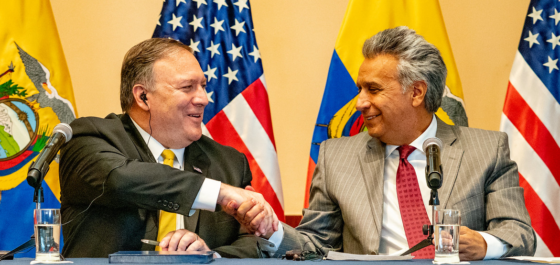
What Did Pompeo Accomplish on His Latin America Trip?
How well is the Trump administration handling its relations with Latin American nations?
Since the closing years of the twentieth century, the countries of Latin America have made significant strides toward opening their economies, reducing poverty and even inequality, and constructing more stable democracies. Progress has not, however, been uniform and steady. There have been a number of setbacks and disappointments, reflected in distinct visions about the most productive path to achieve prosperous and equitable societies.
The purpose of this volume is to take stock of the evolution of some of the most salient political, economic, and social developments in recent years. All of the essays review progress that has been made over the course of a single decade—in most cases, from 1998 to 2008. They provide essential background and are highly germane to the fundamental challenges and opportunities facing the Western Hemisphere in the second decade of the twenty-first century.
The Inter-American Dialogue was interested in taking a hard and systematic look at important changes that have taken place in a range of different spheres. These include: the increasingly pervasive and urgent challenge of citizen security; the results of programs and policies aimed at enhancing the social agenda; the advances and competing priorities in energy development and cooperation; and the fundamental task of building viable democratic systems that foster the rule of law and protect human rights. Also crucial was to examine carefully the vicissitudes of US-Latin American relations, the evolution of hemispheric affairs, the changing nature of trade and investment ties, and Latin America’s increasing role in the global economy.
To analyze these critical issues the Dialogue was fortunate to count on the extremely thoughtful contributions by a set of first-rate Latin American analysts, many of whom have occupied high-level government positions. Their vast experience as practitioners combined with a capacity for acute analysis have given the authors a valuable perspective on these core themes in contemporary Western Hemisphere affairs. The authors represent varied disciplinary backgrounds and political tendencies, and come from Argentina, Bolivia, Brazil, Chile, Ecuador, Guatemala, Peru, and Venezuela.
Their rich treatments of the diverse themes highlight transformations that few analysts anticipated even two decades ago. Latin America has become increasingly confident and assertive in inter-American and global affairs. Many countries have multiplied and diversified relations beyond the Western Hemisphere, especially with Asia—China, in particular. At the same time, the United States and Latin America have sought to redefine their relationship, moving away from overarching visions and grand initiatives and instead focusing on specific problems and taking advantage of particular opportunities.
The growing regional clout and global projection of Brazil exemplifies an underlying change in the character of hemispheric affairs. Further, sharp differences among Latin American countries—notably the contrast between South America and the countries of Central America and Mexico—have become more pronounced over time. Although trade and economic integration have advanced considerably, political consensus and vigorous collective hemispheric action—both to confront common problems like organized crime and take advantage of key opportunities in areas such as energy—have been lacking.
As these chapters make clear, Latin American societies have generated enormous expectations and demands on governments, which have often had trouble responding effectively. There have been both institutional deficiencies and fiscal constraints on policy officials and decision makers—and at times a lack of political will. Still, the region has witnessed the expansion of vital social movements and greater inclusion of traditionally excluded groups such as indigenous populations. Women, too, have markedly increased levels of political participation. On a number of key dimensions democratic progress has been impressive, though the progress has been uneven and some of the gains remain fragile. Clearly a lot of work remains to be done in pursuit of more thoroughgoing reforms that call for effective political leadership, wise policies, and more robust cooperation in this hemisphere and globally.
It is our hope that this compilation will help enrich understanding of the region’s dramatic changes among policy and academic communities in the United States and throughout the Western Hemisphere. We also hope the following chapters provide an in-depth review of broader hemispheric affairs and demonstrate the continuing importance of US economic and political relations with Latin America. We are particularly indebted to the volume’s authors for their intellectual and policy contributions and for illuminating the chief forces that have recently shaped—and continue to shape—a hemispheric landscape in constant flux.
Download the full report below.
How well is the Trump administration handling its relations with Latin American nations?
Daniel P. Erikson, previously Managing Director at Blue Star Strategies, LLC has been sworn in as Deputy Assistant Secretary of Defense (DASD) for Western Hemisphere Affairs.
